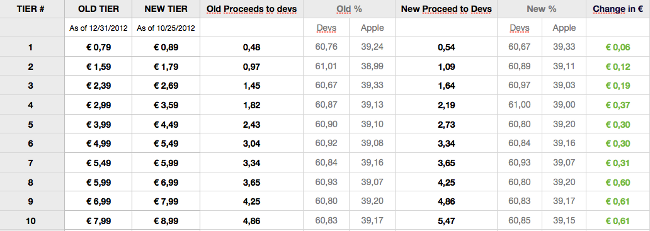The iTunes App Store has raised its prices in three currencies – the euro included – while at the same time introducing local currency pricing for eight countries.
Previously, the lowest price for a paid-for app in the App Store was €0.79. This has been raised to €0.89, with all other prices going up also.
This applies to all markets using the euro, while higher prices have also been introduced for the Mexican peso and Danish kroner.
The new pricing matrix may be a response to fluctuating exchange rates, given the poor performance of the euro, or it could have something to do with tax. Apple’s European iTunes operation is based in Luxembourg, where it pays VAT of 15pc, and this cost is passed on to developers.
It’s not only Apple who will make more money from the price hike, though, as it maintains its 40pc share on revenue, passing additional earnings on to the developers. A chart shared by Camillo Miller on Twitter shows how developers fare from the new pricing scheme.

Chart via @Camillo Miller on Twitter
This new pricing scheme makes iOS apps costlier than their Android equivalents on Google Play. A quick comparison of some of the top apps from the App Store shows prices are 10pc to 33pc higher than those available on Google Play.
| APP | APP STORE | GOOGLE PLAY |
| Fantasy Premier League 2012-13 Official App | €1.79 | €1.56 |
| TuneIn Radio Pro | €0.89 | €0.70 |
| Minecraft – Pocket Edition | €5.99 | €5.49 |
| Couch-to-5K | €1.79 | €1.50 |
One reader contacted us via Twitter to say the price of the Ryanair app – released yesterday for €3 on Google Play – went up to €3.59 in the App Store on the same day.
Price changes are also said to have been introduced to the Mac App Store.
Local payments
In addition to a new pricing matrix, Apple also announced to developers that eight new local currencies are now supported by the App Store. Apps will now be priced in ruble in Russia, lira in Turkey, rupee in India, rupiah in Indonesia, new shekel in Israel, riyal in Saudi Arabia, rand in South Africa and dirham in United Arab Emirates.
According to the International Business Times, the introduction of rupee prices in India means lower prices for this market as customers no longer have to bear the brunt of US dollar exchange rates.